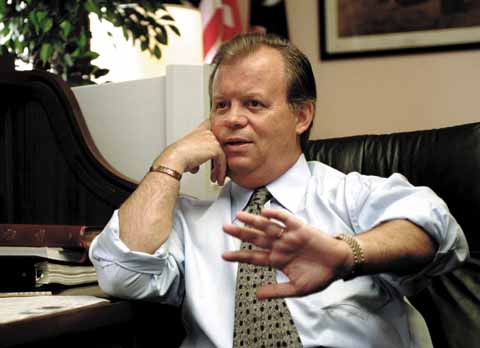
U.S. ambassador and RPCV Tony Hall: WFP Policy on Donations of Food Derived From Biotechnology
World Food Program
Annual Session of the Executive Board
May 29, 2003
Statement by U.S. Ambassador Tony Hall
WFP Policy on Donations of Food Derived From Biotechnology
Mr. President, the U.S. position on foods derived from biotechnology is clear. American children and millions of people around the world have been eating it for years, without ill effect. Biotech foods help nourish the world’s hungry, offer tremendous potential for better health and nutrition, and protect the environment by reducing soil erosion and pesticide use. This position is fully endorsed by the recent joint biotech report from the national science academies of the United Kingdom, Brazil, China, India, Mexico and the United States.
All of the food donated by the people of the U.S. has passed our vigorous food safety and environmental impact testing. We therefore consider it safe for consumption and are happy to provide it as food aid around the world.
Last week, I was back in Washington speaking with many of my former colleagues in Congress. They are astounded by some of the positions taken in opposition to biotech food. They are flabbergasted by the inflammatory and unscientific statements that lead to widespread concern.
I am sure that if they heard some of the statements made today by my friends and colleagues here, their reaction would not be so kind. They would not be simply confused or perplexed. They would be angry. That said, the Executive Board of WFP is not the place to have the full debate about biotechnology. The WTO, Codex and other venues are better suited for that.
Last week, President Bush stated his position clearly. He supports biotechnology in an effort to "increase agricultural productivity and feed more people across Africa." He hopes that our friends and partners in Europe will "join – not hinder – the great cause of ending hunger in Africa."
While I recognize that there is opposition to this technology, our common goal should be to work closely with all food-insecure countries to better understand the facts and science of biotech foods. Misunderstandings and misperceptions should not lead to delays and blockages which endanger the lives of millions of people.
When I visited Southern Africa last year, I heard of food waiting weeks at the borders to Zimbabwe over concerns that were eventually addressed. What I didn’t hear was any one of the hungry people waiting for food express any concerns about biotech food.
When Zambia ultimately decided against the acceptance of this food, WFP removed 18,000 of corn donated by the United States. It took them weeks to get the exit permits and cost almost a million dollars. In fact, some of the food rotted, while people went hungry all around the warehouses. Proving that we care more about hungry people than winning rhetorical arguments, we provided an additional 25,000 tons of non-biotech commodities to Zambia.
The U.S. government supports the efforts of WFP’s Executive Director, and his colleagues at WTO, FAO and WHO, to resolve the impasse regarding biotechnology. Specifically, regarding the Cartagena Protocol, which is not yet in force, we agree that WFP "does not have the legal mandate to impose unilaterally any of the Protocol’s provisions upon transactions involving other parties."
Allow me to conclude with the words of former President and Nobel Laureate, Jimmy Carter: "if imports like these biotechnology crops are regulated unnecessarily, the real losers will be the developing nations. Their countries could suffer for years to come. It is crucial to reject the propaganda of extremist groups before it is too late."
